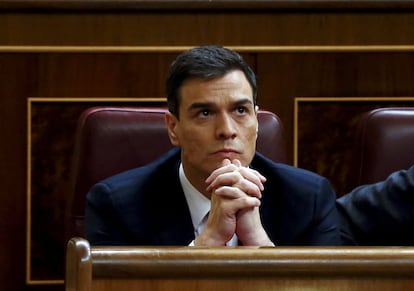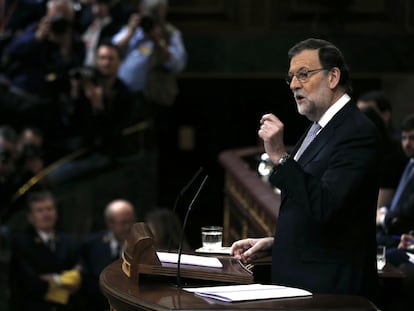Two more months of uncertainty await, as Socialists lose second vote
Party chief Pedro Sánchez’s bid to be voted in as prime minister fails once more

As was widely expected, Socialist Party (PSOE) chief Pedro Sánchez was unsuccessful on Friday evening at a second investiture vote, at which deputies in Spain’s lower house once more rejected his candidature as prime minister.
Sánchez had already lost a first vote on Wednesday in Congress, after a day of debate. In the wake of inconclusive general elections, held on December 20, Sánchez needed a majority in that first round if he were to be successful. But from a total of 350 seats, he only counted on 90 from his own group and 40 from emerging center-right group Ciudadanos, with whom the PSOE signed a policy agreement last week paving the way for this week’s bid to form a minority government. There were 219 votes against and one abstention on Wednesday – Sánchez needed 176 votes for an absolute majority.
Sánchez’s speech touched on corruption, which he defined as “the venom that weakens democracy”
At the second vote, on Friday evening, Sánchez would have only needed a simple majority to become prime minister – i.e. more yes votes than no. But once again, he failed to garner support outside of his party and Ciudadanos. The only difference between tonight’s vote and Wednesday’s was a vote in favor from the Canarian Coalition, which voted in favor instead of abstaining. As such, Sánchez secured 131 votes in favor, and 219 against – far from the simple majority he needed.
Unlike on Wednesday, when party chiefs had the whole day to debate Sánchez’s plans for a government – plans that were harshly attacked by the incumbent Popular Party (PP) and emerging anti-austerity group Podemos – Sánchez had just 10 minutes to lay out his bid to form a government, while other parties had between three and five minutes each in response to state their positions ahead of the vote.
Sánchez’s speech touched on corruption, which he defined as “the venom that weakens democracy.” He also pledged to reform the Spanish Constitution, which he described as being “the best inheritance of our parents,” but one that was in need of change.
You have not come here with a real program, one that would have secured you the support you need Acting Prime Minister Mariano Rajoy
“The ambition of forming a government is in your hands,” he concluded. “Change can only come from pacts, dialogue and cross-party agreements. In a few minutes it will be clear whether we have been able to think in the general interest or not.”
Then came acting Prime Minister Mariano Rajoy’s speech, which he opened by clearly and concisely stating that his party would “be voting no” to the investiture of the Socialist Party candidate.
“You have not come here with a real program, one that would have secured you the support you need,” Rajoy said in reference to Sánchez’s plan for government. “As such, we cannot support a fictional program.”
Then it was the turn of Spain’s third-most-voted party at the elections, anti-austerity group Podemos. Its leader, pony-tailed former political science professor Pablo Iglesias, used his time to remind Sánchez that a leftist coalition was possible. “You know how we are going to vote,” Iglesias told the assembled deputies. “But tonight we can start to work so that there is a government like the one in Valencia [where a leftist coalition is in place in the region]. I accept the condition that the PSOE be in that government, but accept that the rest of the progressive parties are there too. Let’s all compromise and start to work together.”
In the wake of Friday night’s vote, another two-month period will now begin during which the parties can seek a new agreement to form a government. If that fails, Spain will be forced to hold fresh elections later in the year, most likely in June.
Tu suscripción se está usando en otro dispositivo
¿Quieres añadir otro usuario a tu suscripción?
Si continúas leyendo en este dispositivo, no se podrá leer en el otro.
FlechaTu suscripción se está usando en otro dispositivo y solo puedes acceder a EL PAÍS desde un dispositivo a la vez.
Si quieres compartir tu cuenta, cambia tu suscripción a la modalidad Premium, así podrás añadir otro usuario. Cada uno accederá con su propia cuenta de email, lo que os permitirá personalizar vuestra experiencia en EL PAÍS.
En el caso de no saber quién está usando tu cuenta, te recomendamos cambiar tu contraseña aquí.
Si decides continuar compartiendo tu cuenta, este mensaje se mostrará en tu dispositivo y en el de la otra persona que está usando tu cuenta de forma indefinida, afectando a tu experiencia de lectura. Puedes consultar aquí los términos y condiciones de la suscripción digital.










































